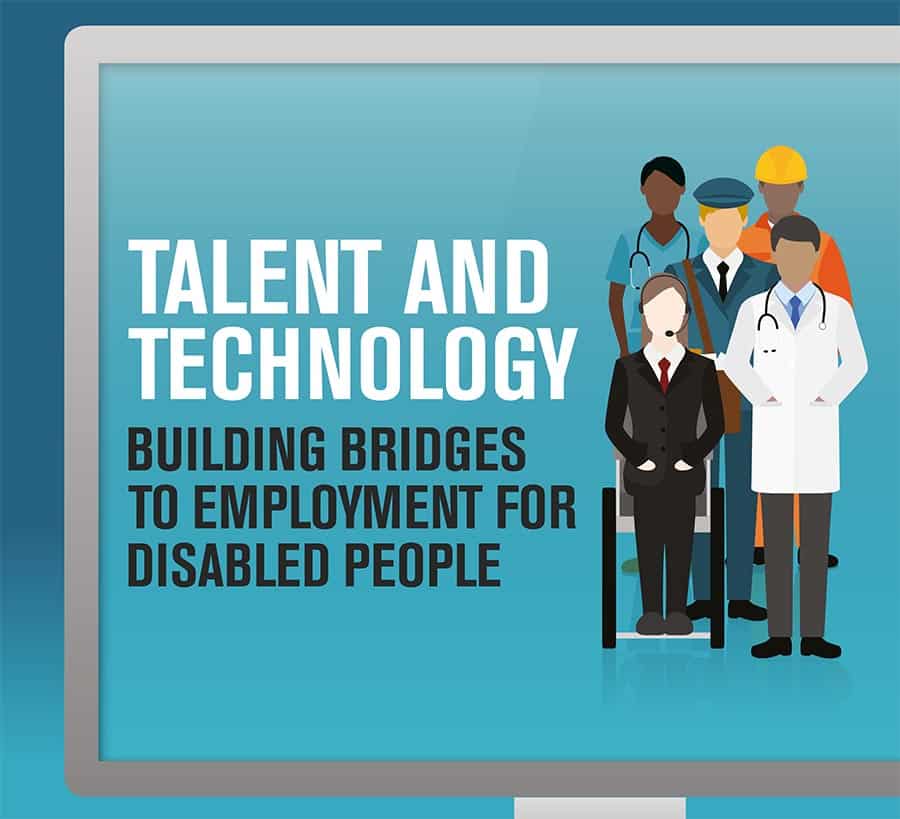Key recommendations from APPGAT’s report on using assistive tech to help disabled people get work

The All-Party Parliamentary Group for Assistive Technology (APPGAT) has published a report, which makes a series of recommendations on how assistive technology can be used to build bridges to employment for disabled people.
Written by Geena Vabulas, Policy Manager at Policy Connect, the report is called ‘Talent and Technology: Building bridges to employment for disabled people’.
APPGAT aims to disseminate knowledge, generate debate and facilitate engagement on assistive technology amongst Members of both Houses of Parliament. The group does this through holding events in Parliament, bringing experts together for roundtable discussions and briefings, contributing to government consultations, and promoting the group and its activities amongst parliamentarians.
It is co-chaired by Lord Shinkwin and Lilian Greenwood MP.
In the report’s foreword by both chairs, it states: “In an age when digital is ‘no longer optional’ for finding work, it is crucial that disabled people have full digital access, including access to assistive technologies (AT).
“The last 18 months have thrown into sharp relief that equality of opportunity depends on the extent to which we harness talent and technology. Both are essential, as never before, to building bridges to employment for disabled people.”
Below are some of the key findings and recommendations from the Talent and Technology report that the UK Government, education providers and employers should take on board to enable disabled people to get into work.
Ensure equitable access to digital for disabled people
The report found that current provision of assistive technologies leaves disabled people in digital ‘black holes’ at key transition points that effect their ability to find and secure employment. It says that the UK Government is not ambitious enough about ensuring equitable access to digital for disabled people.
Consequently, the report advises that the government appoints a National Assistive Technology Champion. They would be responsible for delivering – in coordination with disabled people – a framework on disabled people’s life transitions that guarantees access to digital, which meets the needs of the individual at all stages of life.
Provide disabled students with knowledge and skills on using assistive technology in the workplace
APPGAT found that disabled students are leaving education with a lack of knowledge about work-based assistive technology provision, a lack of skills on using this technology at work, and no confidence on navigating these issues when starting a new job.
It therefore recommends that education providers ensure careers education, information, advice and guidance (CEIAG) and disability support and guidance is joined-up so that education leavers know how to access assistive technology and support to enable their transition into employment.
In addition, it says that the Department for Education (DfE) should produce and promote guidance and resources for education providers on assistive technology and workplaces and preparing for employment. This should include information about Access to Work and other routes to securing access to assistive technology.
Disabled people on short-term work placements should have access to assistive equipment
APPGAT says that, currently, Access to Work does not put assistive technology in place fast enough for disabled students on short-term work placements. The report adds that education professionals can be unaware of this DWP-sponsored support.
Resultantly, the Department for Work and Pensions (DWP) and DfE should collaborate to ensure that disabled people on work placements/traineeships/apprenticeships are able to use assistive technology from day one of their placements, the group suggests.
“This support could be developed as an enhanced Access to Work offer jointly sponsored by both departments, or as a fund available to education providers, or a combination of both elements,” the report adds.
More should be done to remove digital barriers to employment for unemployed disabled people
From its findings, the report discovered that the government is not strategically identifying and removing digital barriers to employment for unemployed disabled people.
It therefore recommends that the government takes advantage of existing JobCentre Plue (JCP) structures to identify and remove digital barriers to employment for JCP customers.
To achieve this, the DWP should commission a review of current JCP assistive technology procurement practice, with a focus on the use of the Flexible Support Fund. APPGAT says the focus should be on adopting inclusive practices, rather than relying on customers disclosing their digital barriers.
Furthermore, the report advises that all DWP contracts related to job support should include consideration of how clients will be supported to use technology as an enabler.
Boost knowledge among of employees and employers on importance of digital accessibility
The report states that employees and employers do not have sufficient understanding of the importance of digital accessibility and how assistive technology can remove barriers, nor routes to provision of assistive technology in the workplace.
To help tackle this, APPGAT suggests that the government improves targeting of disability support schemes to employers and employees who need them most (e.g. boosting the number of SMEs in the Disability Confident scheme; increasing the proportion of self-employed people using Access to Work).
In order to do this, the government should collect data on who is participating in these schemes, with consideration for:
- Employer size, industry, and region
- Employee age, ethnicity, educational background, and type of disability
Based on this data, the government should launch a targeted campaign to recruit currently underrepresented participants. The success of the campaign should be measured by how well Disability Confident and Access to Work participants represent the UK as a whole.
Moreover, the report says that the government should commission Disability Confident Leaders (Level 3) with assistive technology expertise to produce resources for their fellow employers on technology, disability, and best practice.
It continues: “Employers should ensure their recruitment and on-boarding practices are digitally accessible and inclusive by following guidance produced by Disability Confident Leaders. Staff, in particular managers and HR teams, should be provided with CPD on accessibility and assistive technology.”

